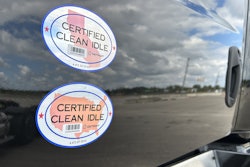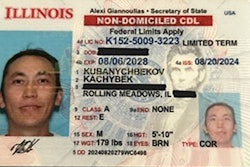Update: On November 10, 2025, the D.C. Court of Appeals ordered the non-domiciled CDL Interim Final Rule paused for further deliberation of the case discussed in this story. Find more about that pause via this link. Original story follows.
An owner-operator's petition to stop the Department of Transportation's new rule looking to purge 200,000 non-domiciled CDL holders from the industry got a response from the DOT, as well as petitioners' counter, and now the U.S. Court of Appeals for the D.C. Circuit will decide the fate of the rule in just a few weeks.
The original suit, filed three weeks after DOT's emergency rulemaking went into effect seeking to stop the rule, challenged the Federal Motor Carrier Safety Administration's logic behind banning most CDLs for non-citizens. The lawsuit's lead named plaintiff is an owner-operator who won't be able to renew his CDL and is backed by big unions representing teachers and government workers.
The owner-operator in question, Jorge Rivera Lujan, came to the U.S. at two years old and operates a small fleet.
Now that DOT has responded to the petition to the court to stay the rule immediately, it's clear there's one thing both DOT and the petitioners agree on: DOT does not have comprehensive data linking citizenship or state of domicile to safety outcomes.

[Related: Non-domiciled CDL drivers say DOT’s new rule violates their civil rights]
The DOT response, filed on October 31, argues that it doesn't need any such data. Problems with reviewing the driving records of non-citizens and the current state of driver's licensing agencies necessitate the rule.
"Instead" of a broad study on safety impacts of non-citizen drivers that would take months or years to complete, DOT wrote, "the salient point is that State licensing authorities do not (and cannot) assess with the same degree of confidence a non-domiciled applicant’s safety because individuals domiciled outside a given State but seeking a CDL -- a category almost entirely comprised of non-domiciled aliens -- tend to have driving histories outside the reach of U.S. State-level agencies."
Therefore, it's fair game to shut down non-domiciled CDLs, DOT said. It's the federal agency's job to set the standards for CDL testing, and the standards include asking for 10 years of driving records. That's a regulation on the books going back to 1986 and the Commercial Motor Vehicle Safety Act. Since state DMVs can't really find out the driving records of a CDL applicant from a foreign country, DOT now finds those drivers don't make the cut.
"It is well within the agency’s regulatory ambit to decide that credentialing individuals whose driving history is largely or entirely unknown does not provide an appropriate margin of safety," DOT argued. "That is all the more true where many State-level agencies are demonstrably incapable of operating the non-domiciled CDL program effectively."
DOT's rulemaking and press push around the rule change has routinely stressed CDL credentialing wrongdoing in California and five other states. Separate from the rulemaking, DOT in October vowed to "go after" unscrupulous CDL schools and motor carriers who employ non-citizen drivers, as well as shippers who load drivers who can't speak the English language.
DOT didn't completely shut down non-domiciled CDLs. Visitors to the U.S. with an H-2A, H-2B, or E-2 employment-based visa can still be eligible for a non-domiciled CDL. DOT reasons that since these drivers undergo background checks as part of the visa application process, "employers have strong incentives to exercise diligence in screening individuals sponsored for those visas."
[Related: State Department pauses truck driving visas: Who is and isn't impacted]
But what about Lujan, the small fleet owner whose CDL is at risk? Lujan has legal authority to live in and work in the country, as would the other 200,000 non-domiciled CDL holders DOT seeks to purge, but not necessarily legal authority to drive big trucks, DOT said.
"Employers may be obligated to verify prospective employees’ employment status, but generic work authorization does not mean suitability for any and every job," DOT wrote, adding drivers like Lujan can find another non-driving job at minimum cost. It is common for small fleet owners like Lujan to transition out of driving roles as their administrative burden grows.
DOT shifts the argument from safety data, which it has never claimed to have, to licensing requirements, essentially putting its foot down on anyone who seeks to get a CDL without the requisite driving records.
But the petitioners have a strong counter: Lujan does have 10 years of motor vehicle records in the U.S. as a Deferred Action for Childhood Arrivals (DACA) program beneficiary. The driving experience of many DACA recipients like Lujan are "entirely within the United States," the petitioners wrote in response to DOT in the November 3 filing. "To qualify for DACA, a person must have '[co]me to the United States before reaching [their] 16th birthday” and 'continuously resided' there."
Some asylum seekers, too, would have an established driving history in the country. Because visitors on H-2A visas only travel to the U.S. seasonally, these drivers might even have less experience driving in the country, the petitioners argued in a previous filing.
Petitioners also argue that courts must stop the rule because drivers like Lujan and thousands of others would be injured by losing their work, and potentially their healthcare, too. They also offer a labor shortage argument in making their case, saying "fewer workers available to repair or maintain roads results in more dangerous driving conditions and longer delays for emergency services."
For that reason and a few others, the petitioners ask the court to stop the rule.
[Related: Did DOT Secretary Duffy just kill trucking's 'driver shortage' narrative once and for all?]
If the court decides to stop the rule, DOT argued in its recent filing, it should only do so with respect to certain classes of non-citizens. For example, if the court decides to stay the rule on behalf of DACA recipients, DOT asks it not to also stay the rule for asylum seekers or other groups of non-citizens.
You can download the court documents via this link to the DOT's October 31 response to the original petition to stay the non-domiciled CDL rule change, and this link to petitioners' November 3 response.
This petition will not go to trial. The judges of the U.S. Court of Appeals for the D.C. Circuit will consider and decide in the coming weeks.
[Related: Homeland Security explains how 'illegal aliens' get CDLs in the U.S.]











